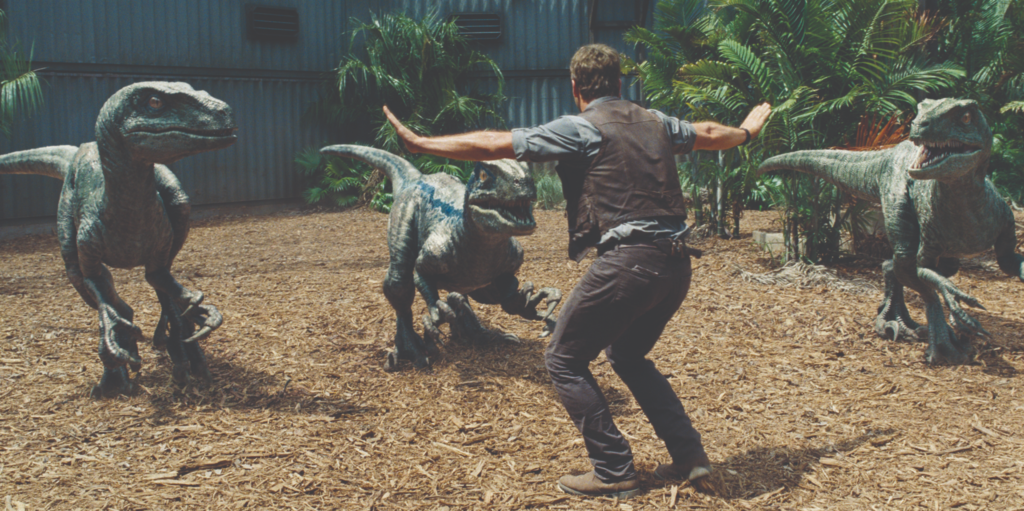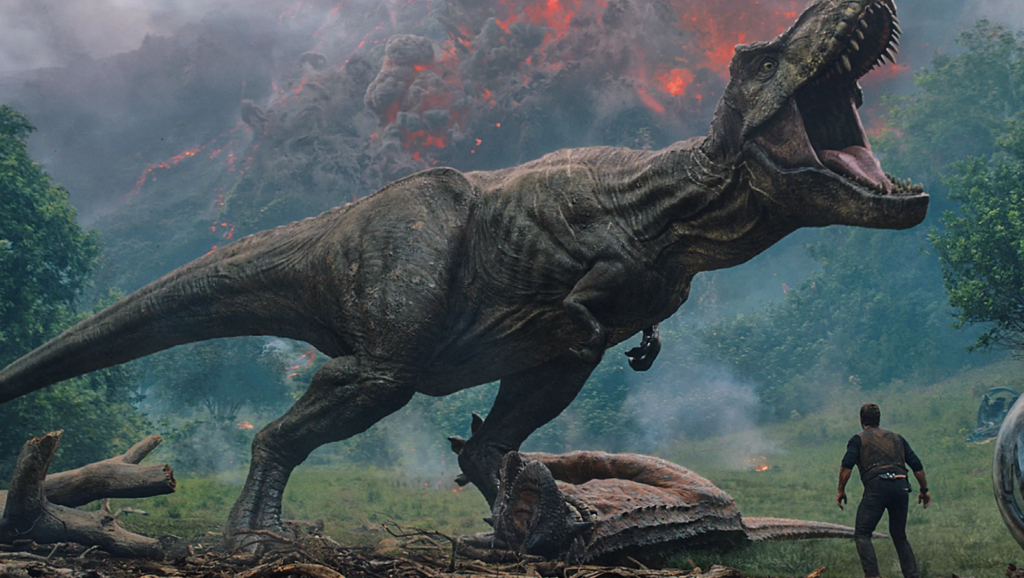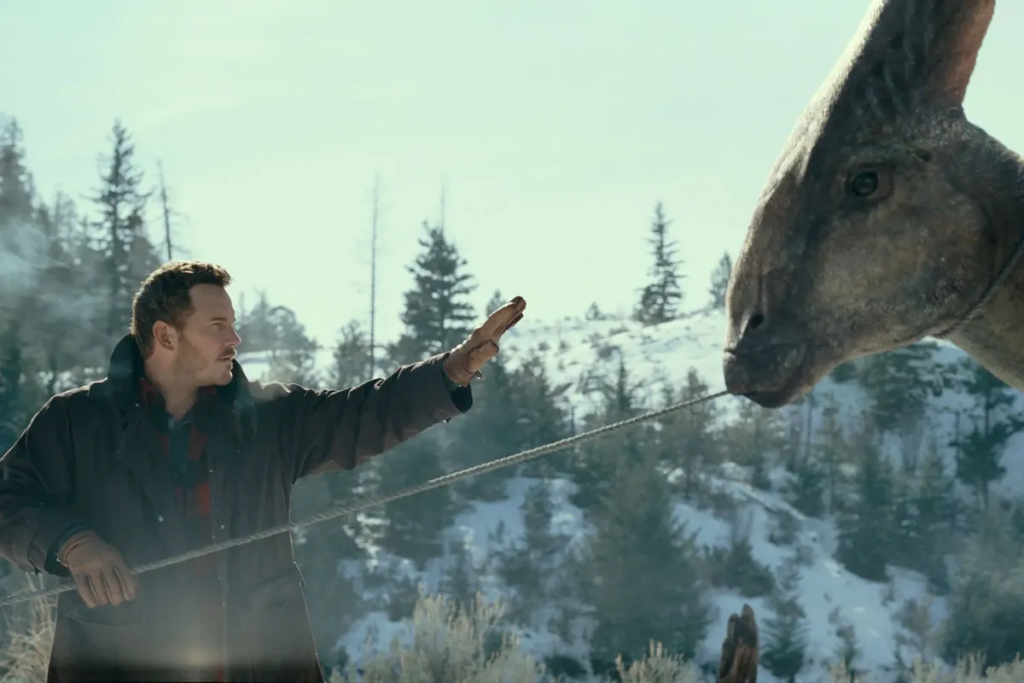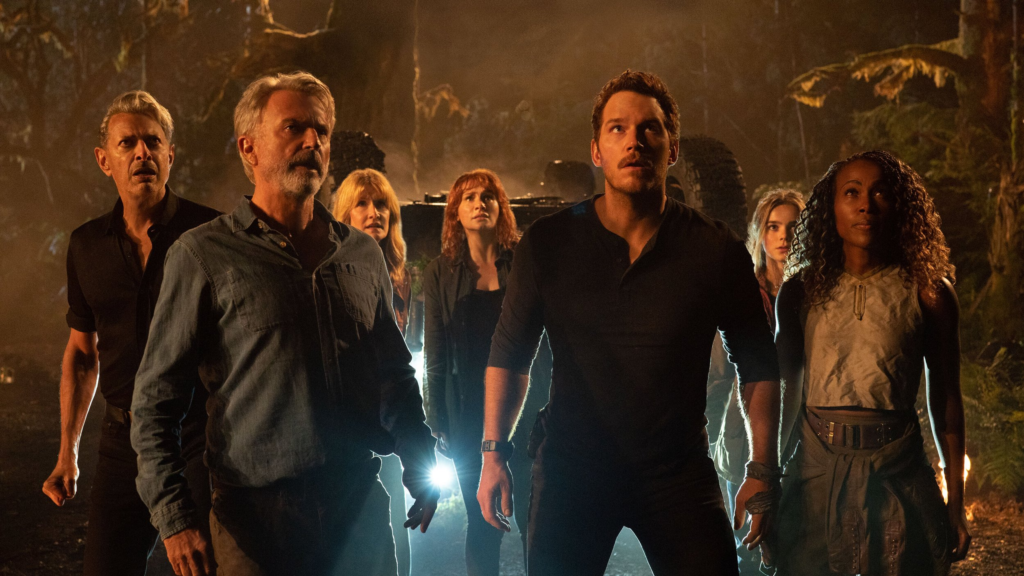When it comes to box office success and general audience appreciation, legacy sequels are pretty straightforward. Lots of nostalgia for a beloved property, some crowd-pleasing cameos, plucky new heroes to accept a passed torch – if you follow the formula and get a halfway competent team on board, they’re as much of a safe bet as anything in Hollywood can be. Star Wars: The Force Awakens was exalted on release. Ghostbusters Afterlife didn’t offend anyone. The first Hobbit (legacy prequel but still bent over backwards to get as many nostalgic references in as possible) received good reviews. Scream (2022) had a lucrative blast skewering the very idea of legacy sequels. Jurassic World was a box-office behemoth.
But things get a little trickier when the time comes to follow your nostalgic investor-pleasing return to the well. Consider the pattern: The Last Jedi went for knotty ideas and thematic subversion that thrilled many but invited backlash so severe that Lucasfilm followed it with a two-and-a-half-hour-long apology, which appeased nobody. The Hobbit sequels tried for something more colorful and elastic that was ultimately met with a shrug by exhausted audiences. Scream VI was inventive in its kills but had nothing new to say, which is a cardinal sin for a Scream movie. Terminator tried to reboot its reboot with another reboot, arrogantly assuming that audiences burned several times before would listen when the producers insisted that this time they’d got it right (they hadn’t). Halloween had absolutely nowhere new to go in Ends or Kills, unless you count focusing on a teenage delinquent as your main antagonist rather than Michael Myers.

And then there’s Jurassic World.
Like so many of these rebooted franchises, all three Jurassic World films cleaned up at the box office despite the critical consensus being that they’re kind of terrible. And that’s not unfair. They are kind of terrible. At their best, they’re goofy crowd pleasers with enough dinosaur action to keep you engaged, but even that reading assumes you’re not at least a little bit disheartened by the descent from one of Spielberg’s greatest blockbuster classics to flaming locusts.
Granted, few long-running franchises are ever able to match the power of their first instalment, and Jurassic Park, like Jaws before it, is no exception. The difference is that Jaws never lent itself to a sequel, while the original Jurassic Park is rife with implications about where it could go next. This is partly what made its two initial follow ups so underwhelming; both were content to mostly keep the dinosaurs on the island, the humans on the run and the status quo exactly where it was at the end of the first film.
By contrast, the World films tried to fulfill the promise of the original and entirely screwed it up. But what really rubs salt in the wound are the moments throughout where you catch fleeting glimpses of just what these movies could have been.
It’s always a bit eye rolling when a movie made by a mega-corporation takes tame pot-shots at the capitalist system that gave it birth (cough, Barbie, cough), but Jurassic World largely gets away with it because the seeds of the park’s destructive commodification are very much planted by Ian Malcolm’s warnings in the first Park. Seeing the new version plastered with big brands while executives wholesale inventing a dinosaur to please investors feels like, well, basically what would happen in real life. In one of the best scenes in the film, the scientifically outdated appearances of the dinosaurs are addressed not only with the fact that they have been altered by spliced DNA, but the insinuation that they were deliberately manufactured to resemble what people in the ‘90s thought dinosaurs should look like. Given the lengths the film goes to remind you of the hallowed original, it’s a surprisingly sharp edge that very nearly pushes Jurassic World into thought-provoking, satirical territory. The suggestion here is that it’s more important these ‘dinosaurs’ give people what they think they want than be in any way representative of their extinct forebears. It’s not especially hard to track where that metaphor is aimed.
But even ignoring any meta implications, this plot point has prescience. Consider the very real efforts to ‘resurrect’ the Woolly Mammoth or the Thylacine, a marsupial predator hunted to extinction by settlers in early 20th century Australia. While cloning has long been the presumed method of bringing them back, more recently a complex process has been raised for discussion that effectively amounts to taking a living relative of the extinct animal and reverse engineering its DNA to come up with a close approximation. If it looks like a mammoth, is it a mammoth? Will it matter to the inevitable crowds flocking to see the ‘de-extinct’ animal?
Jurassic World almost engages with this question, but it can’t resist putting the focus more on crowd pleasing nostalgia or scenes where the T-rex and raptors team up against the lab designed monster in a righteous takedown that ignores the fact that they’re all lab designed monsters. It’s a lot of fun if you like seeing dinosaurs fight (which in fairness most sane people do) but it comes off as a hollow cover version of the original film, lacking in soul, tension, wonder, thoughtfulness or dynamic characters.

Fallen Kingdom gave the first indication that these new films had any intention of moving beyond the ‘humans chased by dinosaurs on an island’ template that characterized all previous films in the franchise. While the first half of the film is precisely that, the second pivots to something weirder and more interesting. The idea of billionaires bidding at auction on exciting new dinosaurs rings very true, even if these films’ insistence on positioning raptors as a desirable asset for a military that has drones does not.
Then there’s the introduction of Maisie Lockwood (Isabella Sermon), revealed to be a clone of the deceased daughter of Jurassic Park’s hitherto unmentioned co-founder. Some criticized this plot point as too silly, ignoring that it was the inevitable result of the technology introduced in the first film. Of course the very rich would bring back their loved ones if they could. But the film does next to nothing with the reveal, showing little interest in engaging with the ethical ramifications of it. Benjamin Lockwood (James Cromwell), the cloner in question, is presented as a benevolent old man who misses his daughter – a depressing case of modern blockbuster reluctance to engage with moral ambiguity lest somebody be made a little uncomfortable.
To that point, even Maisie’s final choice to release the dinosaurs into the wild never really gets held to account, in either this film or the sequel that is ostensibly about the consequences of that very decision. Furthermore there’s one beat where protagonists Owen (Chris Pratt) and Claire (Bryce Dallas Howard) are called out over their culpability in creating this new world, which again could have made for some desperately needed character development or thematic weight, but is quickly skipped over in favorof more cool imagery and John Williams evoking music.
Fallen Kingdom often feels like three different films mashed together, but it’s comfortably the most fascinating of the World films, and the one least concerned with nostalgic pandering. However, one aspect is consistent with the films on either side of it; a tendency to gesture towards compelling ideas before running as far as possible from them. There’s a certain smugness to the way these scripts seem to expect points for even mentioning thorny concepts, while missing the fact that thorny concepts only make for drama if they’re, you know, dramatized.

If Fallen Kingdom is the most interesting, then Dominion is the most frustrating. Following the previous film’s genuinely thrilling cliffhanger, Dominion was set up to finally realize the promise of Crichton’s premise. What does a world where dinosaurs and humans coexist look like?
Unfortunately, we still don’t know, because everyone was too busy focusing on the locusts.
You can sort of see why Dominion made this choice. Director Colin Trevorrow worked overtime in interviews to stress that it wouldn’t be credible for dinosaurs to have taken over the world when only a handful of them escaped in Kingdom. While this is true, credibility didn’t seem to be a problem when Owen was crawling unaffected away from lava that was inches from his face. These films can never decide if they want to be silly blockbusters or serious science fiction continuations of Crichton and Spielberg’s work.
Dominion briefly comes to life in the Malta chase sequence, but that’s because it’s the only scene in the film that almost delivers what was promised; dinosaurs wreaking havoc in the human world. The audacity of having most of the action then take place in another remote dinosaur reserve while trying to claim it’s different because it’s in the mountains rather than an island demonstrates Starkiller Base levels of audience contempt.
And in case bungling an irresistible set up wasn’t enough, Dominion also reunites the three protagonists of the first film then proceeds to do nothing worthwhile with them. Ellie Sattler (Laura Dern) is now a one-note crusader while Alan Grant (Sam Neill) waffles along behind her, looking more like a confused old man than Neill has ever looked in his whole career. The film insists on romantically getting them back together because it assumes that’s what audiences want, but even Jurassic Park III understood that there was power and humanity in a melancholic separation due to different desires. Say what you will about that film, but at least Alan and Ellie felt like the same people they were in the original, with the same foibles that always would have doomed them as a couple. Meanwhile Dominion leaves Jeff Goldblum to spout embarrassing pseudo-philosophical dialogue that evokes his way of speaking in the earlier films provided you remove all wit and meaning.
But one of the worst offenses is how the film retcons Maisie Lockwood so that she is no longer the product of a billionaire’s hubris, but the lovingly designed offspring of a genius mother. It’s a choice that so obviously exists to avoid having to engage with Maisie’s angst over who she is if she’s not ‘real’ or the bigger questions that invites. It serves as the final nail in the coffin of this franchise; these movies can’t even commit to their own halfway interesting ideas.

The Jurassic World Trilogy was damned by reverence. The films started out scared to chart their own path and when they were finally forced to, they vacillated between ridiculous action, vaguely mumbled sci-fi dilemmas, and a need to remind the audience at every turn how good Spielberg’s film was, which amounted to little more than self-sabotage. Unable to embrace either insanity or intelligence, the films aren’t much of anything. Which stings because the potential for something far better is right there, tauntingly out of reach.





